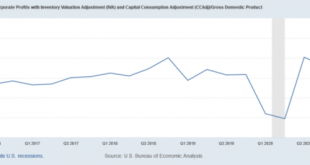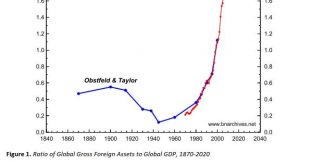from Dean Baker That simple point might have been worth mentioning in an article reporting on efforts by Democrats to rein in prescription drug costs since 1989. The current level of spending of roughly $500 billion a year comes to more than $1,500 for every person in the country. Annual spending on prescription drugs is roughly one and a half times as much as the proposed spending in President Biden’s Build Back Better proposal. It’s also worth noting that this piece repeatedly refers to...
Read More »World money, world creditocracy
from Radhika Desai and Michael Hudson We are now ready to approach the question of how these national monetary orders of capitalism relate to one another internationally. One key contradiction has powered the history of world money under capitalism. On the one hand, money is created by states or those delegated and controlled by them. On the other, there can be no world state under capitalism, and thus no world money. When dominant states nevertheless seek to foist their currency on...
Read More »Rich jerks in space
from Dean Baker As a big fan of the original Star Trek, I have to confess that it was kind of neat to see Captain Kirk actually go into space. But there is a real issue here about the silly games of the super-rich that is worth some thought. There have been numerous stories and papers about the huge increase in the wealth of the super-rich since the pandemic began. Virtually all of this is due to the run-up in the stock market during this period. Part of that is bounce back, the S&P...
Read More »Soft-wars
from Blair Fix Political economist Chris Mouré has a new paper out in the Review of Capital as Power. It’s called ‘Soft-wars’, and it is a fascinating case study of the behavior of big tech. The story starts in 2011, when Microsoft led a $4.5 billion consortium purchase of Nortel and Novel. Later than year, Google responded by buying Motorola for $12.9 billion. The funny thing is that Google then proceeded to sell off what it had just bought. By 2014, almost nothing was left of...
Read More »USU College of Science Fall Convocation Speeches
USU College of Science Fall Convocation was held virtually on Sept 30, 2021. Fall Convocation donor and alumni speaker Dr. Willy Lensch ’91 benefited from a scholarship, when he was an undergrad. In his brief talk, Willy, who recently left a position as strategist for Harvard Medical School and now serves as an associate provost for Harvard’s research office, describes challenges of the past year in coordinating a multi-institution pandemic response effort. He likens those...
Read More »David Card and the minimum wage myth
from Lars Syll Back in 1992, New Jersey raised the minimum wage by 18 per cent while its neighbour state, Pennsylvania, left its minimum wage unchanged. Unemployment in New Jersey should — according to mainstream economic theory’s competitive model — have increased relative to Pennsylvania. However, when ‘Nobel prize’ winning economist David Card and his colleague Alan Krueger gathered information on fast food restaurants in the two states to check what employment effects the minimum wage...
Read More »WEA letter of support for scientists in Mexico
Prosecutors in Mexico seeking arrest warrants for more than 30 scientists “The World Economic Association –with its 15,000 members-is committed to the development, promotion and diffusion of economic research and knowledge; advocating plurality of thought, method and philosophy. We are convinced that these activities can only be carried out in a context of freedom, exempt of intimidation and harassment. In this spirit we voice our apprehension for the 31 Mexican scientists and scientific...
Read More »If this is a wage-price spiral, why are profits soaring?
from Dean Baker That’s the question millions are asking, even if economic reporters are not. The classic story of a wage price spiral is that workers demand higher pay, employers are then forced to pass on higher wages in higher prices, which then leads workers to demand higher pay, repeat. We are seeing many stories telling us that this is the world we now face. A big problem with that story is the profit share of GDP has actually risen sharply in the last two quarters from already high...
Read More »How emerging markets hurt poor countries
from C. P. Chandrasekhar and Jayati Ghosh It is by now well known that three decades of financial globalization have led to massive increases in income and asset inequalities in the United States and Europe. But in the developing world, the effects of financial globalization have been even worse: along with new inequality and instability, the creation of “emerging markets” to support investment in poor countries has undermined development projects and created a relationship in which poor...
Read More »Weekend read – Red Giant
from Shimshon Bichler and Jonathan Nitzan Introduction In 2012, we published a paper in the Journal of Critical Globalization Studies titled ‘Imperialism and Financialism: The Story of a Nexus’. Our topic was the chameleon-like Marxist notion of imperialism and how its different theories related to finance. Here is the article’s summary: Over the past century, the nexus of imperialism and financialism has become a major axis of Marxist theory and praxis. Many Marxists consider this...
Read More » Real-World Economics Review
Real-World Economics Review





